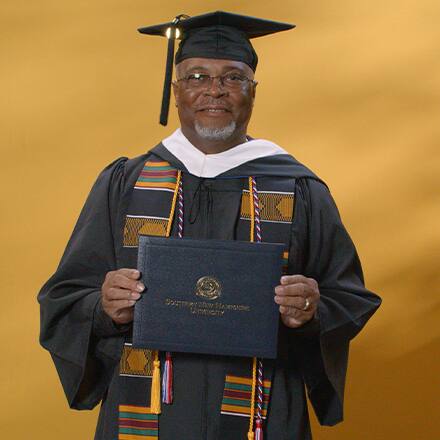What Can You Do with a Master’s in English?

Understanding the Numbers
When reviewing job growth and salary information, it’s important to remember that actual numbers can vary due to many different factors — like years of experience in the role, industry of employment, geographic location, worker skill and economic conditions. Cited projections do not guarantee actual salary or job growth.
Earning a bachelor's degree is a significant achievement, but once it's completed you may find yourself wondering what comes next. To increase your chances in a highly competitive job market or to qualify for a specific role, your next step may take you upwards on the higher education ladder toward a graduate degree.
As this level of education intensively focuses on a single area of study rather than a core of complementary disciplines, it's important to figure out what skill set you need to master in order to pursue your personal and professional goals. You may find that one of the most valuable programs to consider is a master's in English.
Mastering Critical Thinking
The commonly held idea that a degree in English is about reading lots of books and figuring out when on earth you actually use a semicolon captures only a small part of the picture. While you'll spend a lot of time reading your way through the works of famous authors and analyzing layers of meaning, the most valuable skills a graduate earns along the way makes them highly flexible and uniquely equipped to succeed in a wide range of careers.
 Sharon Kehl Califano, associate dean of programs for creative writing and literature, pointed to the critical thinking skills that are at the heart of these studies. "(Students) engage in deep-level inquiry related to theoretical frameworks that are complicated and (rigorous), which challenge the status quo and promote innovative problem-solving," she said.
Sharon Kehl Califano, associate dean of programs for creative writing and literature, pointed to the critical thinking skills that are at the heart of these studies. "(Students) engage in deep-level inquiry related to theoretical frameworks that are complicated and (rigorous), which challenge the status quo and promote innovative problem-solving," she said.
This deep dive uses the critical theory skills English students use throughout the program to illuminate new perspectives on works of literature. The same skills can be applied to complicated processes in the professional world to tackle administrative or operational challenges. An English graduate's resumé can stand out to employers looking for candidates with strong analytical and problem-solving skills.
As the ability to think and work in conjunction with technology is a skill that will be in increasingly high demand, English graduates retain a vital place in the Digital Age as virtuosos of effective communication and innovation.
Developing Skills Employers are Seeking
The big question for you may well be whether or not a potential employer will want to see an English degree on your resumé. While some job listings will simply state that a certain educational or experience level is required, having a graduate degree in English, specifically, can put you at an advantage in many interviews. It all comes down to those analytical and communication skills, as they immediately translate in an employer's mind to transferable skills, according to author and Forbes contributor Martin John Yate.
Liz Ryan, another contributor for Forbes with a background in human resources, lists independent thinking and problem-solving as key qualities employers avidly look for when seeking new employees. "Strong managers want to hire people who have their own ideas,"she wrote. Demonstrating these skills as you sit across from a prospective employer can be one of the best ways to form a meaningful connection. "In the best job interviews, your manager will see your brain working and you'll see his or her brain working, too," Ryan said.
Califano agrees with Ryan's assessment. "(We) need more employees who demonstrate deeper-level thinking and strategy. English majors are thinkers, writers, communicators," she said.
Master’s in English Jobs
While a graduate program in English will prepare you for a broad spectrum of possible career paths, you may be looking to pursue something specific. So, what jobs would you be ready to go for with this degree on your resumé? Here are a few that an English graduate would be eminently equipped for:
- Post-Secondary Instructor - Graduates with a master's degree in English can be ideal candidates for teaching positions. Though you will need additional certification or licensure in order to teach at the primary or secondary level, this program will prepare you to start teaching for most community colleges or online courses at the undergraduate level. Breaking down the projections for the next decade, the Bureau of Labor Statistics (BLS) forecasts that job opportunities for part-time post-secondary instructors will increase. If you're looking to one day work for a school district or become a professor, this is a great way to start gaining experience while you pursue the additional studies needed to advance in your career.
- Editor - English graduates with a passion for the written word who are interested in the publishing industry may find a natural pathway into the editing role. Whether your interest is in helping aspiring authors realize their dreams of writing bestsellers, compiling the biggest news of the day for a newspaper, or taking advantage of the publishing power of the internet, a keen eye for language is an asset. Though BLS lists the minimum educational requirement for this role as a bachelor's degree, the advanced skills earned through a master's program could boost your chances in this competitive job market.
- Survey Researcher/Analyst - If you are data-driven and have strong math skills, the analytical acumen developed in a graduate-level English program can be the basis of a strong resumé for a survey analyst. They create, conduct and analyze surveys, and their expertise is in demand in a number of industries, according to BLS. The ability to appreciate and apply analytical methodology to an inquiry could see you into a career within higher education, nonprofit organizations, or even for the military or federal government.
- Copywriter/Content Writer - Look around you and you'll find writing everywhere - the magazines in every doctor's waiting room, brochures, social media announcements, websites, blogs, advertisements, PR announcements, etc. Good writing is the backbone of how the world connects in the age of the internet and everyone from business owners to political candidates are on the look-out for strong writers to tell their stories. As writing jobs tend to attract large pools of applicants, BLS recommends supplementing your education with experience such as blogging, journalism, and internships to boost your resumé.
- Freelancer - Ever wanted to be your own boss? With the skills learned from earning a master's degree in English, you will have the writing and analytical know-how many businesses need for projects that go beyond their existing pool of employees. The Freelancing in America: 2017 report, released in September 2017, estimated that more than 50% of America's workforce would be made up of freelance talent by 2027. You can set yourself up as a professional editor, virtual assistant, social media manager or copywriter, becoming part of this growing economic trend.
Educational Pathways for English Post Grads
Considering moving onto a doctoral program or pursuing another degree later in your career? A master's degree in English serves as an invaluable stepping stone. Whether you want to branch out into museum studies or refine your thesis into a dissertation that will earn you a Ph.D., those analytical, writing, and communication skills will be invaluable. According to Califano, these abilities are pivotal to any advanced educational pathway.
Getting the Most Out of Your Master’s in English
A master's program in English is one of the most flexible degree programs you can consider, given its universal relevance. The learning doesn't end once the diploma is in your hand. Califano encourages students to seek out connections among faculty and peers to form a network to call upon throughout your career. She also recommends establishing a relationship with a mentor who will push you to challenge the limits, taking courses that speak to your passions, and continually keeping an eye out for opportunities to develop those core skills that will take you forward to whatever goals you set yourself.
Sarah A. Easley '12 '18MA is a professional content writer and proofreader. Connect with her on Twitter or LinkedIn.
Explore more content like this article

Why is Poetry Important? Celebrating National Poetry Month

Meet Betty White Stamp Artist Dale Stephanos, SNHU Graphic Design Grad

SNHU Spotlight: Dennis Peacock, BA in Graphic Design Grad
About Southern New Hampshire University

SNHU is a nonprofit, accredited university with a mission to make high-quality education more accessible and affordable for everyone.
Founded in 1932, and online since 1995, we’ve helped countless students reach their goals with flexible, career-focused programs. Our 300-acre campus in Manchester, NH is home to over 3,000 students, and we serve over 135,000 students online. Visit our about SNHU page to learn more about our mission, accreditations, leadership team, national recognitions and awards.

